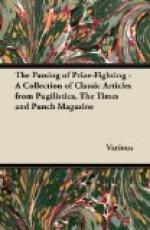The next day found me again near the sheds. Mr. Diggles was nowhere in sight. I approached unobtrusively through the hedge and accosted a small boy.
“Hulloa, my little man,” I said, “what is your department in this hive of industry? You weed the mushrooms, perhaps, or prune them?” He seemed shy and offered no answer. “Perhaps you hoe between the plants or syringe them with insecticide?”
Still I could not win his confidence, so I tried pressing sixpence into his palm. “Between ourselves, what are the weekly takings?” I said. He pocketed the coin and put his finger on his lips.
“Belge," he said. Then he bolted into a shed and returned accompanied by Mr. Diggles. There was nothing for it but to purchase another pound of mushrooms. I was no nearer “A Fortune in Fungus” than before.
Two days later, having received apparently reliable information that Mr. Diggles was confined to his bed with influenza, I ventured again to visit the sheds. I was advancing boldly across the field when to my consternation he suddenly appeared from behind a hayrick. I was so startled that I turned to fly, and in my precipitancy tripped on a tussock and fell. Mr. Diggles came to my assistance, and, when he had helped me to my feet and brushed me down with a birch broom he was carrying, I could do nothing less than buy another pound of his mushrooms.
I felt it was time to consult Biddick. He was sitting at his desk staring at a blank sheet of paper. His fingers were harrowing his hair and he looked distraught.
“Excuse the interruption,” I said, “but this ‘Fortune in Fungus’ is ruining me;” and I related my experience.
At the finish Biddick gripped my hand and spoke with some emotion. “Dear old chap,” he said, “it’s my line, after all. It’s funny. If only I can do it justice;” and he shook his fountain-pen.
This morning I received a guinea and a newspaper cutting entitled “A Cadger for Copy,” which may appeal to some people’s sense of humour. It makes none to mine. In the flap of the envelope Biddick writes: “Halves, with best thanks.”
Upon consideration I shall forward him a simple formal receipt.
* * * * *
[Illustration: “IT LOOKS QUITE LIKE PRE-WAR BACON.”
“ON THE CONTRARY, MADAM, PERMIT ME TO ASSURE YOU IT IS OUR FINEST ‘POST-BELLUM STREAKY.’”]
* * * * *
From a bookseller’s catalogue:—
“THE ART OF TATTING.
This book is intended for
the woman who has time to spare
for reading, Tatting being
such quick and easy work that busy
fingers can do both at the
same time.”
An edition in Braille would appear to be contemplated.
* * * * *
THE GERM.
The great Bacteriologist entered the lecture-room and ascended the platform. A murmur of astonishment ran round the audience as they beheld, not the haggard face of a man who daily risked the possibility of being awarded the O.B.E., but the calm and smiling countenance of one who had succeeded where other scientists, even of Anglo-American reputation, had failed.




